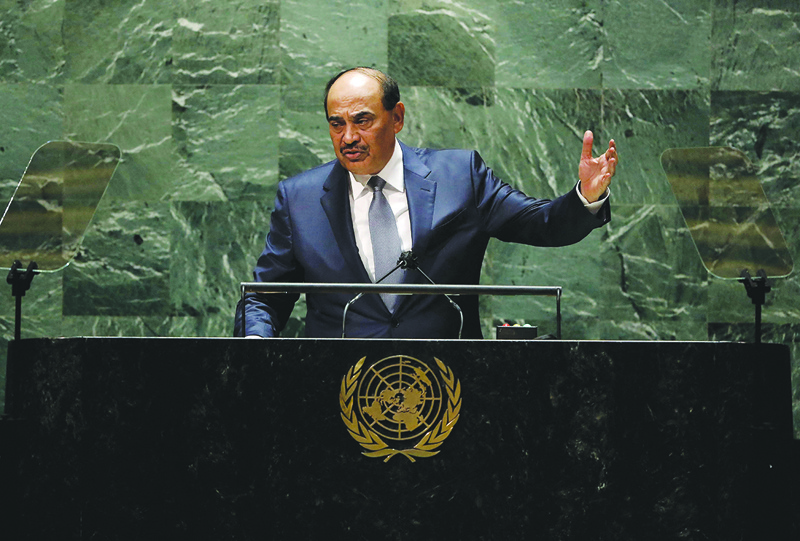 NEW YORK: HH the Prime Minister of Kuwait Sheikh Sabah Al-Khaled Al-Hamad Al-Sabah addresses the General Debate of the 76th Session of the United Nations General Assembly at UN headquarters on Friday. - AFP
NEW YORK: HH the Prime Minister of Kuwait Sheikh Sabah Al-Khaled Al-Hamad Al-Sabah addresses the General Debate of the 76th Session of the United Nations General Assembly at UN headquarters on Friday. - AFPNEW YORK: Kuwait has provided assistance worth $327.4 million to initiatives worldwide aiming to ensure an equal distribution of COVID-19 vaccines, particularly to impoverished nations, HH the Amir Sheikh Nawaf Al-Ahmad Al-Jaber Al-Sabah's representative said on Friday. Speaking at a United Nations General Assembly session, HH the Prime Minister Sheikh Sabah Al-Khaled Al-Hamad Al-Sabah called to ensure "a fair and safe global distribution of vaccines to all countries to reach a comprehensive immunization level".
Recently, Kuwait contributed $40 million to Covax, a worldwide vaccine distribution initiative co-led by the World Health Organization, and the GAVI vaccine alliance, which aims to expand vaccine accessibility and improve governments' health systems, administered by civil society and global organizations. Domestically, the country has also ensured a fair distribution of globally-approved vaccines amongst its communities of nationals and residents, with a high coverage rate of 72 percent of the population.
On the repercussions of the deadly coronavirus pandemic, which has so far claimed the lives of over 4.7 million victims and caused widescale damage to economies and livelihoods and food scarcity, Sheikh Sabah said "the extent of the scars will remain present for a long time in the conscience of the world".
The prime minister paid special homage to frontliners and health workers, "who from us, deserve a standing ovation and our appreciation". However, he said an eventual global recovery will require "steps to invest in data and information infrastructure". "This will contribute to improvements in the decision-making process in order to protect societies from similar future crises," he added.
On a positive note, Sheikh Sabah said that in spite of these negative aftereffects, the pandemic has been a "major catalyst for change and rebuilding for the better on the political, economic and social levels". This was demonstrated in the rapid response and cooperation, through domestic and international scientific research, that resulted in the production of multiple vaccines, he explained.
Kuwait also called on Iran anew to adopt "serious measures" towards building confidence in the region based on respect of sovereignty and non-interference in affairs of countries. Iran should also work towards reducing tension in the Gulf region, and preserving safety, freedom and security of maritime navigation from any threats to ultimately contribute to building relations based on mutual cooperation and respect, Sheikh Sabah told the UNGA session.
These measures, he added, would honor aspirations of regional countries to enjoy security and stability, which would achieve prosperity and development of the people. Kuwait, HH the Prime Minister said, was looking forward for see regional and international efforts to bring about success to an international conference on clearing the Middle East from nuclear weapons and weapons of mass destruction, due in the UN in New York in November.
Kuwait also said on Friday it hopes the United Nations climate change conference, COP26, scheduled to be held in Glasgow in November, leads to a constructive review of progress and deficiencies in relation to environmental responsibility-sharing. Climate change has severely affected achievements made on the global scale to reach sustainable development goals, Sheikh Sabah said in his speech.
The effects of climate change have been evident in noticeable temperature rises, increasing intensity of storms and floods and decreasing green spaces due to the widespread recurrence of forest fires around the world, he added. Neglecting the matter "will have severe environmental repercussions", he warned. - KUNA










